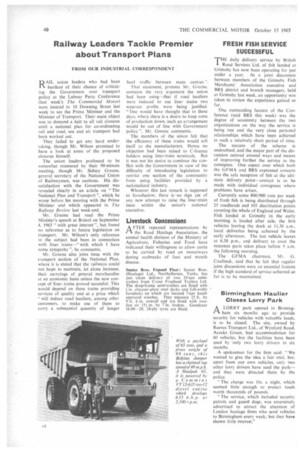Railway Leaders Tackle Premier about Transport Plans
Page 42

If you've noticed an error in this article please click here to report it so we can fix it.
FROM OUR INDUSTRIAL CORRESPONDENT D AIL union leaders who had been
baulked of their chance of criticizing the Government over transport policy at the Labour Party Conference (last week's The Commercial Motor) went instead to 10 Downing Street last week to see the Prime. Minister and the Minister of Transport. Their main object was to demand a halt to all rail closures until a national plan for co-ordinating rail and road, sea and air transport had been worked out.
They failed to get any hard undertaking, though Mr. Wilson promised to have a look at some of the proposed closures himself.
The union leaders professed to be somewhat reassured by their 90-minute meeting. though Mr. Sidney Greene, general secretary of the National Union of Railwaymen, was cautious. His dissatisfaction with the Government was revealed clearly in an article on "The National Plan and Transport ", which he wrote before his meeting with the Prime Minister and which appeared in The Railway Review last week-end.
Mr. Greene had read the Prime Minister's speech at Bristol on September 4, 1965 "with great interest", but found no reference as to future legislation on transport. Mr. Wilson's only reference to the subject had been in connection with liner trains—" with which I have some sympathy ". he comments.
Mr. Greene also joins issue with the transport section of the National Plan, where it is stated that the railways could not hope to maintain, let alone increase, their carryings of general merchandise at an economic basis unless the new concept of liner trains proved sucessful. This would depend on these trains providing services of quality and at a price which "will induce road hauliers, among other customers, to make use of them to carry a substantial quantity of longer haul traffic between main centres".
That statement, protests Mr. Greene. contains the very argument the union had been using—that if road hauliers were induced to use liner trains two separate profits were being justified. "One would have thought that in these days. where there is a desire to keep costs of production down, such an arrangement would be out of line with Government policy ", Mr. Greene comments.
The members of the union felt that the efficiency of these trains would sell itself to the manufacturers. Hence no objection had been raised to C-licence holders using liner-train terminals. But it was not his desire to continue the conflict with the Government in view of the difficulty of introducing legislation to restrict one section of the community from using facilities provided by a nationalized industry.
Whatever this last remark is supposed to foreshadow, there isno sign yet of any new attempt to raise the liner-train issue within the union's national executive.
Livestock Concessions AFTER repeated representations by the Road Haulage Association, the animal health division of the Ministry of Agriculture. Fisheries and Food have indicated their willingness to allow cattle to be carried by road on motorways
during outbreaks of foot and mouth disease.








































































































































